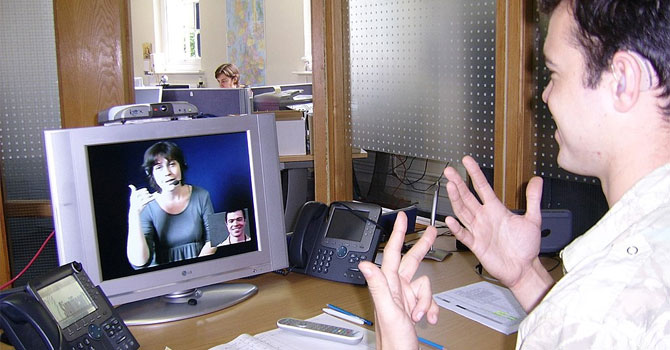If you’re an expert in American Sign Language (ASL), or even just know the basics, there are plenty of online ASL jobs available for you to help others while making money.
- Inbox Dollars - Get paid to check your email. $5 bonus just for signing up!
- Survey Junkie - The #1 survey site that doesn't suck. Short surveys, high payouts, simply the best.
- Nielsen - Download their app and get paid $50!
One in five Americans have hearing loss in at least one ear and three out of every 1,000 children are born deaf or hard of hearing.
Based on these statistics, Deaf people—the proper term for deaf persons who share a language and a culture—are a huge part of the workforce.
That said, they still sometimes need communication support.
Hearing people who know ASL and are skilled in working with Deaf people are thus increasingly in demand in various industries.
Today, I run down some ASL jobs you’ll be able to do online.
8 Online ASL Jobs You Can Do Remotely
Some, if not all of these jobs have been traditionally done face-to-face. Nowadays, with technology where it is, you’re able to do them over the internet.
While the list below details the different types of jobs available, I wanted to first provide you with 3 different ASL job boards to bookmark.
If you want a job in this industry, check these 3 sites often:
Here are some online ASL jobs to consider applying for, or even doing by yourself as an independent contractor or as a self-employed individual.
1. Employment Counselor
An employment counselor for Deaf people and the hard of hearing is someone who provides assistance in finding career opportunities and job placements for them.
Employment counselors can also be involved in developing advocacy programs in agencies serving Deaf people.
State and private agencies, rehabilitation centers, and nonprofit organizations are just some potential employers of employment counselors.
Education/Degrees/Certificate Required
Educational programs and training in this field prepare students in client assessment, principles of counseling, educational research, basic career development, and career program design.
To become a full-fledged employment counselor, you’d usually need a master’s degree in counseling or career counseling, with a focus on career development.
If you can get a certification by taking the National Certified Counselor examination (offered through the National Board of Certified Counselors), it will help you get a leg up on other applicants.
2. Psychologist
Deaf people may need psychologists with whom they can communicate through their language and not just through text.
Clinical psychologists may offer therapy, counseling, and diagnostic tests. Research psychologists conduct research on psychology and mental health as they relate to Deaf people, as well as people who have hearing loss or are hard of hearing.
Schools, mental health clinics, research centers, and hospitals hire psychologists in different capacities.
Education/Degrees/Certificate Required
Psychologists who work with Deaf people need specialized education and a doctorate, which may take at least five to seven years to get it.
You can get either a Doctorate in Psychology (PsyD) or Ph.D. in Clinical Psychology, with a special focus on the deaf and hard of hearing populations.
Subjects that you take throughout your college education include sign language competency, psychology and deafness, clinical psychology, ethics, dissertation research, psychopharmacology, cognitive psychology, and child and adult development.
Also, getting either doctorate requires internship placements, a practicum, clinical training, a dissertation, and licensing; practicing psychologists and those who are employed by schools require licensure from all states.
No joke. Here are the fastest ways to make easy money online. Click here to see how.
Each state has different requirements, and Association of State And Provincial Psychology Boards and National Association of School Psychologists would have more complete information.
3. Real-Time ASL Interpreter
A real-time ASL interpreter is someone who is responsible for helping Deaf people understand something spoken in real time.

There are a wide variety of situations when this is required. For instance, company and business meetings, depositions for court, medical offices and hospitals, government agencies, classrooms, and many other institutional settings.
Due to the increase in the use of video relay services, Internet video can be streamed along with an ASL interpreter simultaneously to a Deaf person.
Education/Degrees/Certificate Required
Sign language interpreters would need a bachelor’s degree in ASL/English interpretation from an accredited interpreter program, as this is a minimum requirement to get a certification through the Registry of Interpreters for the Deaf.
There are also special training courses in sign language regional nuances, techniques, ethical standards, and legal standards to be able to work in any setting and region, as well as with anyone.
The bachelor’s program usually includes ASL courses, Deaf studies, communication, psychology, linguistics, and business, after which an internship then a practicum are required.
A master’s degree in ASL/English interpretation is preferred but not required for most employers, but check in with your prospective employers if they do need it.
4. Sign Language Teacher
Sign language teachers educate students of all ages on how to use ASL to communicate with others. They can also teach ASL as a second language to those who are studying to be sign language interpreters.
Education/Degrees/Certificate Required
The degrees and licenses required for sign language teachers are almost the same as those required for teachers wanting to teach in private or public schools. Additional credentials include a certification from the American Sign Language Teachers Association.
Another route you can take is to get a bachelor’s degree in ASL and get course credits in teaching so you can get a teaching credential in your state. Eventually, you can also get a national teaching certification from the National Board Certification or the American Board for Certification of Teacher Excellence.
5. Educator of Deaf Children
An educator of Deaf children teaches a variety of subjects to children of school age, from elementary to high school students, either in schools for Deaf children or in schools where Deaf students are mainstreamed.
Education/Degrees/Certificate Required
You’d need a bachelor’s degree in deaf education, and most programs offer a dual licensure in deaf education and in general and special education.
Core subjects include ASL, audiology, child development and psychology, student teaching experience, and special teacher examinations. The aim is to prepare students to meet the academic, as well as the behavioral, social, and emotional needs of Deaf and hard of hearing children.
Depending on the grade level you want to teach, you’ll need to learn communication techniques and linguistics specific to that grade level, as well as specific academic areas such as math, science, art, or technical skills.
6. ASL Curriculum Writer
Educators for Deaf students need curriculums that take the students’ needs into consideration but still meet state and national education standards, as well as meet technological advances.
ASL curriculum writers create such curriculums and work with instructors and teachers to improve existing ones.
Education/Degrees/Certificate Required
You’d need a bachelor’s degree in Deaf education and at least a state or national certification in teaching ASL.
Employers generally preferred curriculum writers that have at least two years of experience and a master’s degree in curriculum and instruction.
You can make money from home and it doesn't have to be challenging. Click here to see how.
7. Speech-Language Pathologist
This online ASL job requires more education and experience than the others on this list.
Speech disorders are when a person is unable to produce speech sounds correctly or fluently, while language disorders are when a person has trouble expressing themselves or comprehending others.
Speech-language pathologists examine, diagnose, and treat persons with the above disorders.
They also educate patients’ family members, caretakers, and loved ones on strategies to assist patients in coping with their disorders, including communication and social strategies.
Education/Degrees/Certificate Required
To be a speech-language pathologist, you’d need to have a master’s degree in speech-language pathology.
A Certificate of Clinical Competence in Speech-Language Pathology (CCC-SLP) from the American Speech-Language-Hearing Association (ASHA) is another credential that potential employers and clients consider.
8. Occupational Therapist for Deaf students
An occupational therapist, in general, helps injured, ill, or disabled patients through their daily activities by reviewing patients’ medical histories, identifying their current needs, and developing a treatment plan in cooperation with a physician.
Occupational therapists who know ASL and work with Deaf children are hired by schools and school districts to help them participate in school activities.
This involves assessing and evaluating students, identifying their academic needs (as well as personal, emotional, and social needs) that impact their educational goals, developing individual education programs for students, and monitoring them for improvement.
Education/Degrees/Certificate Required
Occupational therapists would need a master’s degree in occupational therapy and would need to be licensed in the state where you’ll be practicing.
As with any other online ASL jobs that involve interactions with Deaf persons, you would need to have at least an intermediate knowledge of ASL. Patience and empathy are also needed to get to the bottom of your patients’ needs.
Effective verbal and written communication skills are also essential to communicate your Deaf students’ needs and educational goals to their hearing teachers and parents.
Essentials When Working An ASL Job
If you do decide to apply for an ASL job, you would need a lot more aside from your ASL skills.
Soft skills that you’d need include genuine compassion and empathy, plenty of patience, excellent communication skills, active listening, interpersonal skills, organization, and proactive problem-solving.
For your home office setup, you’d need to have a quality desktop or laptop computer (if you want the option to work elsewhere outside the house). A high-speed internet connection is also a necessity.
A separate, high-definition webcam is also important, so your gestures can be tracked and transmitted properly. Also, a reliable headset is recommended, as this is more convenient than a separate headphone and microphone setup.
If you don’t have a dedicated room or at least a space for your work yet, this is the time to set it up. Make sure there aren’t visual or auditory interruptions or backgrounds wherever you’re working.
The Bottom Line
Deaf people have special communication needs, and if you’re an ASL expert, there are opportunities for you to assist them to function in their chosen fields and industries.
Aside from the hard skills, degrees, and certifications, remember that the most important skills you need to do this type of job are your soft skills; compassion, empathy, and patience.
Other Language-Based Jobs
Know other languages aside from English or ASL? Check out our other articles:





